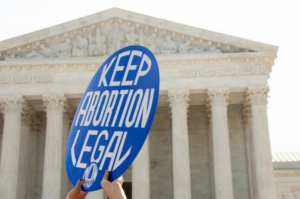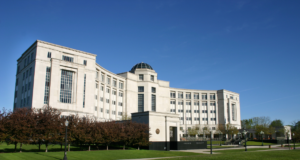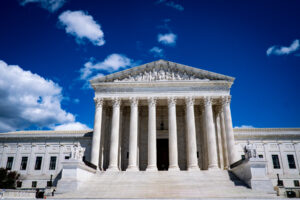U.S. Supreme Court considers taking up abortion providers’ challenge to Texas’ near-total ban on the procedure
4 min read
The U.S. Supreme Court is considering whether to take up abortion providers’ challenge to Texas’ near-total abortion ban sooner than the high court usually would hear arguments.
The lawsuit has not been heard by a federal appellate court, but the Supreme Court agreed Monday afternoon to expedite providers’ request that the justices consider the case. Texas, one of the defendants in the suit, has until Thursday to respond to the petition asking that the case be fast-tracked.
That development came weeks after the court — in the same lawsuit — declined to block Texas’ new abortion restrictions from going into effect. Justices cited procedural reasons for that decision, which came in a 5-4 vote. At the time, the court did not weigh in on the law’s constitutionality.
Monday’s move also came just hours after the Biden administration — in a separate challenge to Texas’ Senate Bill 8 — asked the high court to halt the near-total abortion ban while the U.S. Justice Department’s legal challenge to the new restrictions goes through the courts.
It’s possible that by sometime next week, both of the legal challenges Texas faces — one from abortion providers and one from the Justice Department — could appear on the Supreme Court’s docket, said Josh Blackman, a law professor at South Texas College of Law Houston whose expertise includes constitutional law.
SB 8 bans abortions after an embryo’s cardiac activity is detected, which can happen before many people know they are pregnant, and allows anyone who “aids or abets” such an abortion to be sued. Because enforcement of the law relies on private citizens rather than state officials, it has largely been able to skirt the constitutional right to an abortion first established in 1973 through Roe v. Wade. After it went into effect Sept. 1, some providers stopped offering the procedure altogether out of fear of litigation.
Both lawsuits challenge the law’s constitutionality but are essentially making different arguments, Blackman said. The abortion providers’ lawsuit focuses on how they’re being particularly hindered by the law, while the Justice Department’s focuses more on “suing the [state] government on behalf of the people of Texas.”
Melissa Murray, a professor at the New York University School of Law, said it will be important for the Supreme Court to decide if Texas is in “utter defiance” of Roe v. Wade.
“It really is sort of a broader existential question about does the federal government have a role to play when states utterly defy existing Supreme Court precedent and constitutional law?” Murray said.
In its request filed Monday, the Justice Department argued that allowing the law to stand would “perpetuate the ongoing irreparable injury to the thousands of Texas women who are being denied their constitutional rights.”
The Justice Department’s request comes after a series of federal court decisions flip-flopped on whether the law should remain in effect as its constitutionality is being challenged.
Last Thursday, a panel of federal appellate judges ordered that the law would remain in place. That decision came after a U.S. district court blocked the law for just two days until the 5th U.S. Circuit Court of Appeals — perhaps the most conservative appeals court in the nation — froze the order.
In its filing, the Justice Department argued that Texas crafted an “unprecedented” structure to thwart the courts. SB 8 has made abortion “effectively unavailable” after about six weeks into pregnancy, according to the Justice Department.
“Texas has, in short, successfully nullified this Court’s decisions within its borders,” the Justice Department wrote.
Kim Schwartz, communications director for Texas Right to Life, told The Texas Tribune that the anti-abortion organization doesn’t expect the Biden administration’s effort to succeed.
One of the providers asking their challenge to be fast-tracked is Whole Woman’s Health, which runs four abortion clinics in Texas and half a dozen in other states. The new law has led Whole Woman’s Health to turn away “nearly all patients,” CEO Amy Hagstrom Miller said in a statement.
“The emotional toll for our staff and providers is matched only by the anguish our patients face when they are denied abortion care,” she said. “This injustice must stop and we hope the Supreme Court will do what’s right.”
In a statement posted to its Twitter account, the American Civil Liberties Union wrote, “The devastation this law is causing must end.”
Whole Woman’s Health had resumed the procedure early in pregnancies during the brief window provided by the U.S. district court ruling. Many providers avoided the banned procedure during that period, citing concerns they might be sued if the injunction got lifted.
The bill capped decadeslong efforts to restrict abortion in Texas. In 2005, the state required parental consent for minors seeking the procedure. That same year, the state banned abortions after 24 weeks of pregnancy.
In 2013, the Legislature required Texas abortion clinics to meet hospital-like standards such as minimum sizes for doorways and rooms. That law shuttered almost half of all Texas abortion clinics, though the Supreme Court struck it down in 2016.
But the Supreme Court’s makeup has changed drastically since then. Conservative justices like Brett Kavanaugh and Amy Coney Barrett have replaced liberal ones, leaving experts uncertain about how the court might rule on SB 8.
Blackman said the court’s 5-4 vote last month in its refusal to block SB 8 from going into effect, which included dissent from the court’s three liberal justices and Chief Justice John G. Roberts Jr., could serve as a possible indication for a future ruling.
“I think it’s reasonable to conclude the same five votes will rule against this case,” Blackman said.
This article was originally posted on U.S. Supreme Court considers taking up abortion providers’ challenge to Texas’ near-total ban on the procedure







